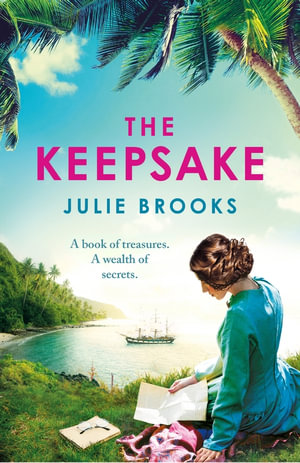The keepsake by Julie Brooks

This narrative is told in two time periods, 1832 and the present time. Constructing this novel, Julie Brooks places her characters in these different times, drawing us into the worlds in which the characters, coming from the same family, live their lives. The story told both in England and the story told in Samoa enables us to be drawn into two very different worlds. Julie Brooks writes a narrative that challenges the reader, where we feel close to the world of the individual character, one who makes decisions without having to gain acceptance of her choices by any other family members.
Prudence Merryfield inherits the family house and property, and she is very strongly determined to live a life that lifts her out of the world into which she was born. Deciding to leave England, her new life begins in a place so different to the English world, and she enjoys her choice, although she must adapt to a new world that is very different to that in which she has lived her life so far. Devon, London, Samoa, Singapore, the South Pacific in its broader sense, is described as we read about Australia, as seen by an Englishwoman who knew little about the world itself.
Overall, we read the narrative that tells of Prudence’s choice of places to live for a time, seeking to be in a world that is not like home, one that challenges her to find a way to live in a totally new world. Essentially, the narrative addresses the idea of ambition, a desire to live in an unknown world, and face how to make choices by one’s self and how they will live and thrive in this different place.
At the heart of this narrative we become aware of the denigration of women in that time, where other family members were adamant in expecting Prudence to marry, which will give her male partner the ownership of the house and land. Prudence realises this and is determined to stay single, deciding that she wished to run her own life, neither to share it with a man, nor to have a man as prime in their relationship. A relative is expecting Prudence to consider marrying a man, and this man will thence run and essentially own the property. Julie Brooks writes of a woman who rejects that kind of life, and thus, taking us into their world, we can see how difficult it was for a woman to be independent, and similarly how a woman would not be considered to own this property once married. If she marries, her inheritance will belong to her male partner, and if she dies, then the property and house will go to a male relative of her father’s.
Eliza, the inheritor, realises that she can find very little information about Prudence. Having disappeared more than 180 years earlier, Prudence has left little for an inheritor to discover. Living in the modern world as she does and having moved into her house, Eliza is appalled at the notion of a woman not being expected, in her time, to own and run a house without a man.
In the summer of 2024, Julie Brooks closes this narrative and leaves us wondering how well Prudence Merryfield lived her life, having left behind a world that would have supported her richly. However, clearly Prudence represents a woman who is determined to make her own life, to choose her place to live and how to make that life count for her. The narrative is brilliant, challenging, richly descriptive of the worlds of this narrative, and intensely memorable.
Themes: Women, Inheritance, Social conditions - 19th century.
Elizabeth Bondar